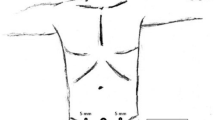Abstract
Background
Diastasis is a separation of the two recti due to various reasons, and can be measured as the ‘inter-recti distance’ (IRD). Surgery for diastasis is controversial, while laparoscopic repair has rarely been reported. We describe our method of laparoscopic plication—the ‘Venetian blinds’ technique combined with mesh reinforcement for patients with diastasis of the recti.
Materials and methods
A total of 18 patients out of 35 that presented to us were operated. The common indications were cosmesis and discomfort while performing normal activities. Laparoscopic plication with the ‘Venetian blinds’ technique of the diastasis with prosthetic reinforcement was performed for all cases.
Results
The mean body mass index (BMI) was 28.6 kg/m2 (range 25–32.2) and obese patients had a larger IRD. The mean operating time was 113 min (range 72–154). Minor complications were present in five (27.77%) patients. The recurrence rate after 6–48 months follow up was 0% in this series.
Discussion
Even though surgery for diastasis is controversial, we advocate repair for cosmesis and restoring function of the recti muscles. Our ‘Venetian blinds’ technique provides a solid repair and reduces the risk of seroma. The use of a prosthesis for the repair is mandatory to prevent recurrence. The adequacy of repair was assessed by measuring the IRD preoperatively and postoperatively with computed tomography (CT) scan. Laparoscopy provides all of the benefits of minimal access surgery.








Similar content being viewed by others
References
Gilleard WL, Brown JMM (1996) Structure and function of the abdominal muscles in primigravid subjects during pregnancy and the immediate postbirth period. Phys Ther 76:750–752
Boissonnault JS, Blaschak MJ (1988) Incidence of diastasis recti abdominis during the childbearing year. Phys Ther 68:1082–1086
Bursch SG (1987) Interrater reliability of diastasis recti abdominis measurement. Phys Ther 67:1077–1079
Lockwood T (1998) Rectus muscle diastasis in males: primary indication for endoscopically assisted abdominoplasty. Plast Reconstr Surg 101:1685–1691
Nahas FX (2001) An aesthetic classification of the abdomen based on the myoaponeurotic layer. Plast Reconstr Surg 108(6):1787–1795; discussion 1796–1797
Nahas FX, Ferreira LM, Augusto SM, Ghelfond C (2005) Long-term follow-up of correction of rectus diastasis. Plast Reconstr Surg 115(6):1736–1741
Nahas FX, Augusto SM, Ghelfond C (1997) Should diastasis recti be corrected? Aesthetic Plast Surg 21(4):285–289
Flament JB, Palot JP, Lubrano D, Levy-Chazal N, Concé JP, Marcus C (2002) Retromuscular prosthetic repair: experience from France. Chirurg 73(10):1053–1058
Gireev GI, Zagirov UZ, Shakhnazarov AM (1997) Treatment of linea alba hernia and diastasis of rectus abdominis. Khirurgiia 7:58–61
Ramirez OM (2000) Abdominoplasty and abdominal wall rehabilitation: a comprehensive approach. Plast Reconstr Surg 105(1):425–435
Nahas FX, Ferreira LM, Mendes Jde A (2004) An efficient way to correct recurrent rectus diastasis. Aesthetic Plast Surg 28(4):189–196
Corrêa FMA (1995) Videoendoscopic subcutaneous techniques for aesthetic and reconstructive plastic surgery. Plast Reconstr Surg 96:446–453
Core GB, Mizgala CL, Bowen JC 3rd, Vasconez LO (1995) Endoscopic abdominoplasty with repair of diastasis recti and abdominal wall hernia. Clin Plast Surg 22:707–722
Champault G, Catheline JM, Barrat C (1998) Video-parietoscopic surgery of the abdominal wall. A study of 15 cases. Chirurgie 123(5):474–477
Chelala E, Gaede F, Douillez V, Dessily M, Alle JL (2003) The suturing concept for laparoscopic mesh fixation in ventral and incisional hernias: preliminary results. Hernia 7:191–196
Palanivelu C, Jani KV, Senthilnathan P, Parthasarathi R, Madhankumar MV, Malladi VK (2007) Laparoscopic sutured closure with mesh reinforcement of incisional hernias. Hernia 11(3):223–228
van Uchelen JH, Kon M, Werker PM (2001) The long-term durability of plication of the anterior rectus sheath assessed by ultrasonography. Plast Reconstr Surg 107(6):1578–1584
Wechsler RJ, Kurtz AB, Needleman L, Dick BW, Feld RI, Hilpert PL, Blum L (1989) Cross-sectional imaging of abdominal wall hernias. AJR Am J Roentgenol 153:517–521
Author information
Authors and Affiliations
Corresponding author
Rights and permissions
About this article
Cite this article
Palanivelu, C., Rangarajan, M., Jategaonkar, P.A. et al. Laparoscopic repair of diastasis recti using the ‘Venetian blinds’ technique of plication with prosthetic reinforcement: a retrospective study. Hernia 13, 287–292 (2009). https://doi.org/10.1007/s10029-008-0464-z
Received:
Accepted:
Published:
Issue Date:
DOI: https://doi.org/10.1007/s10029-008-0464-z




